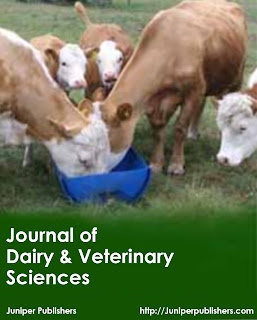Usage of Inulin, Lemon, Carrot and Pea Fibers as Prebiotic for Bifidobacteriun Animalis Subsp. Lactis (BB-12)- Juniper Publishers
Journal of Dairy & Veterinary Sciences- Juniper Publishers
Abstract
Prebiotics, contain oligosaccharides, lignin,
resistant starch, tannins and associated plant substances, stimulate
growth of probiotic organisms. A lot of dietary fibers (DF) are used as
prebiotics in foods. In this study, it was investigated if inulin,
lemon, carrot and pea fibers have prebiotic effect or not on Bifidobacterium animalis subsp. lactis (Bifidobacterium BB-12). For this purpose skimmed milk was inoculated with Bifidobacterium
BB-12 fortified with different DF, such as inulin, lemon, carrot and
pea fibers. According to the results inulin and pea fiber stimulated Bifidobacterium BB-12, whereas lemon and carrot fibers had no prebiotic effect on Bifidobacterium BB-12. The highest prebiotic effect of inulin and pea fiber were found at a level of 2%.
Keywords: Bifidobacterium BB-12; İnulin; Lemon; Carrot; Pea fiber
Abbrevations: DF: Dietary Fiber; BB-12: Bifidobacterium; MRS: Man Ragosa Sharpe; LSD: Least Significant Difference
Introduction
Prebiotics are defined as non digestible food
ingredients that beneficially affect the host by selectively stimulating
the growth and/or activity of one or more desired bacterial species in
the colon, thus improving host health. Many oligosaccharides, are added
to food as prebiotic, mainly to allow the preferential growth of
probiotic organisms and called as prebiotics [1]. Dietary fiber (DF),
which includes oligosaccharides, lignin, resistant starch, tannins and
associated plant substances, is a remnant of the edible part of plant;
it is analogous carbohydrates that are resistant to digestion and
absorption in the human small intestine and undergo complete or partial
fermentation in the human large intestine. It improves human health by
the prevention, reduction and treatment of some diseases, such as
diverticular and coronary heart diseases [2,3]. In this study it was
investigated whether or not inulin, lemon, carrot and pea fibers have
prebiotic effect on Bifidobacterium animalis subsp. lactis (Bifidobacterium BB-12).
Materials and Methods
Bifidobacterium BB-12 (Chr. Hansen, Turkey),
inulin (Sigma, İstanbul), lemon, carrot and pea fibers (Arosel
Food,İstanbul, Turkey) and skim milk powder (Pınar Dairy, İzmir, Turkey)
were used as materials. Man Ragosa Sharpe (MRS) agar, nalidixic acid,
neomycine sulphate, lithium chloride and paramomycine sulp
hate obtained from Sigma chemicals (İstanbul, Turkey). All other
reagents used were of analytical grade. 13 different reconstituted skim
milk, with 12% dry matter, were prepared. For propagation of Bifidobacterium BB-12, each sterile reconstituted skim milk was supplemented with 0.50%, 1% and 2% inulin, lemon, carrot and pea fiber. Bifidobacterium
BB-12 was grown until pH reach to 4.7 at 37°C, using a 0.05% (w/v)
inoculum. The milks were kept cooled at 4°C until for enumeration.
Bacterial counts were determined after 8h fermentation. Fermented milks
were decimally diluted in 100mL sterile peptone water (0.1%) and 1mL
aliquot dilutions were poured onto plates of the various selective and
differential agars in triplicate. Bifidobacterium BB-12 were
incubated anaerobically by using MRS-NNLP agar [4]. The plates were
incubated at 37°C for 72h. Anaerobic conditions were created using
Anaerocult A sochets (Merck). The results were expressed as
colony-forming units per gram (cfu g-1) of sample. Statistical analyses
were carried out using SPSS Version 5.0 (SPSS Inc. Chicago, IL, USA).
Statistically different groups were determined by the LSD (Least
Significant Difference) test [5].
Results and Discussion
Table 1 show the variations in Bifidobacterium BB-12 counts in reconstituted skim milk with and without DF. Bifidobacterium BB-12 counts were found to be in the range of 7.35-7.96 log cfu
g-1, respectively. As seen, inulin and pea fiber had prebiotic effect
for Bifidobacterium BB-12, whereas lemon fiber and carrot fiber
did not have (p< 0.05). Even if a slight increaring was found in the
Bifidobacterium BB-12 counts in the skimmed milk fortified with
lemon and carrot fibers, they were not significant (p>0.05). Pea
fiber led to slight increasing in the number of Bifidobacterium BB-
12, while inulin caused the noticable increasing. Guler-Akın, Göncü,
Akın & Akın, & Güler-Akın [1,6,7] also reported that probiotics
had the ability to ferment DFs.

Fiber level affected the number of Bifidobacterium BB-12 statistically
(p< 0.05). The highest prebiotic effect of inulin and pea
fiber were found at a level of 2%. The higher inulin and pea fiber
added, the more Bifidobacterium BB-12 obtained. The numbers of
Bifidobacterium BB-12 decreased as lemon and carrot fiber increased
(p< 0.05) due to the possible decreasing of water activity
of milk. As known DF is highly hygroscopic and had a high water
binding capacity [8].
Conclusion
Results showed that lemon fiber and carrot fiber didn’t affect
of Bifidobacterium BB-12 counts and they had no prebiotic effect
for Bifidobacterium BB-12. In contrast, inulin and pea fiber stimulated
Bifidobacterium BB-12 and they could be used as potential
prebiotic for Bifidobacterium BB-12.
To know more about journal of veterinary science impact factor: https://juniperpublishers.com/jdvs/index.php




Comments
Post a Comment